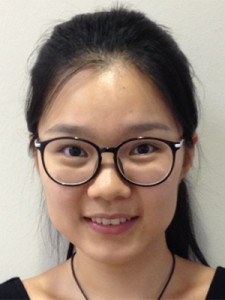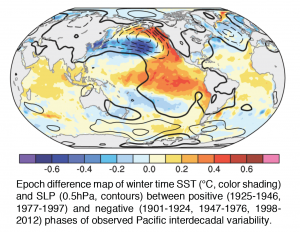UTIG Ph.D. student Tianyi Sun was recently selected for one of three Outstanding Oral awards for the 2018 American Meteorological Society meeting in Austin. She presented on “Role of Stochastic Atmospheric Forcing in Tropical Pacific Decadal Variability and ENSO Modulation.” The presentation can be viewed on the AMS website. We caught up with Tianyi to learn more about her and her studies here at UTIG.

Degree working towards and anticipated graduation date:
PhD in Geological Sciences, focusing on Climate Dynamics; May 2019
Why did you decide to study at UTIG?
During my undergraduate studies in Atmospheric Sciences at Nanjing University (China), I decided to come to the United States for graduate school in hopes that it will lead to an academic career. An advisor with similar research interests, recommended that I apply to UT Austin. Then I browsed the list of researchers and came across Dr. Yuko Okumura’s profile. Our research interest was a perfect match. I contacted Yuko and she happened to be looking for a PhD student; so I came here and became her first student.
I didn’t know much about UTIG before I started but was really impressed by the variety of science and numerous field work people do here. I feel very fortunate and love being part of UTIG by doing what I do.
What is the focus of your studies?
I’m interested in large-scale ocean-atmosphere interactions and climate variability on interannual, interdecadal and longer time scales. My thesis focuses on the stochastically driven interdecadal variability in the Pacific Ocean and its interaction with the El Niño-Southern Oscillation (ENSO) phenomenon. The atmosphere is very powerful and chaotic; it produces day-to-day weather and then quickly forgets about what it did. The ocean, with a large heat capacity, can integrate the stochasticity of the atmospheric circulation and produce low frequency variability. Built on this simple mechanism, I investigate how the decadal changes in the mean state of tropical Pacific is influenced by stochastic atmospheric forcing, and how the mean state changes modulate ENSO activity. Most of my work is done with climate model simulations. I also analyze observational datasets to look for validation for the modeling results.
How did you get interested in climate science?
Whenever I’m asked this question, I wish I had a perfect childhood story that led to what I’m studying, but the truth is, I’ve just always liked all aspects of natural sciences and wanted to figure things out as much as I can. When I was in high school and it was time to choose a major for college, I picked atmospheric sciences and have enjoyed learning about it for 8 years. For me, I believe that it’s not possible to get truly interested in a research field or topic without sticking my head into it, listening and reading about it, and actually poking around and getting my hands dirty. It takes time to cultivate that initial curiosity to a research interest. I was lucky to stumble into climate science and am just fascinated by it. Now as I learn more about the complications behind a simple global mean temperature curve, I realize what it means for people’s lives that we have a deep understanding of the climate system.

You recently received an award for your presentation at the American Meteorological Society’s Austin meeting – what did it mean to you to receive that award?
I was honored to be recognized for my research and also how I communicate my work. It’s always difficult to communicate technical results to anyone who does not know about my research. Learning to do good scientific communication is a long road ahead; this is a good start.
What is your favorite part about studying and working at UTIG?
The variety of scientific research conducted here really opens my eyes. As students, we are offered many opportunities and resources to explore the subfields of Geophysics. I’m able to collaborate with paleoclimatologists to learn about past climate. I also went into the field during the Marine Geology and Geophysics course and learned about sedimentology and seismology. UTIG expands my horizons.

What advice would you give to new graduate students?
I recently had a casual chat with one of my colleagues about the difficult times during graduate studies than for the newcomers. They said, “scientific research is an exponential curve, and we’ve just started off from x=0. Sometimes you may feel that you are not moving forward at all, but it will get better soon.”
What are your career goals for after you graduate?
I hope to stay in academia, so doing a postdoc will be the way to go. Ideally, I want to do research and teach throughout my entire career.
